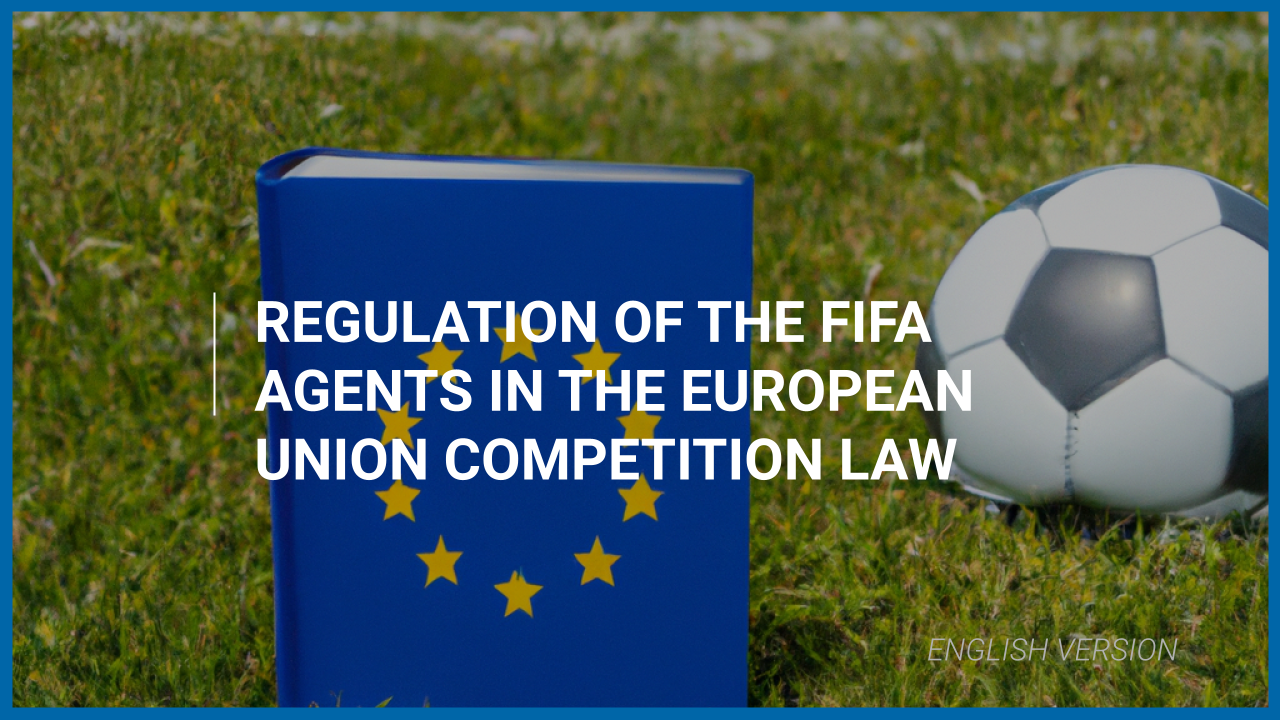Authors : Juan Carlos Soto Del Castillo and Jagoba Goiri Garrastazu
Lawyers
Versions of the article availables in others languages:
Published and translated by the firm Winter – Dávila & Associés
Paris, 1 August 2023
Abbreviations:
TFEU: Treaty on the Functioning of the European Union.
CJEU: Court of Justice of the European Union
CJEU: Judgment of the Court of Justice of the European Union
EU: European Union
Keywords:
Economic activity; Agents; Competition law; Enterprise; FIFA; Restriction ; Meca-Medina; Competition law; Company.
Summary:
In this article, a brief exposition is made about the Dortmund Court Judgment that orders the adoption of precautionary measures in the application of the FIFA Regulation that governs agents. The Court understands that the doctrine of the Meca-Medina case cannot be applied because, besides not meeting the requirements, it lacks the essential requirement, which is the sports regulations.
Text:
Before addressing the issue of the regulation of agents by the FIFA Regulation it is necessary to establish the normative and jurisprudential context of the EU.
YOU CAN ALSO READ: The New FIFA Regulations for Football Agents
Articles 101 and 102 TFEU are the legal precepts on which EU competition law is currently built.
Article 101 TFUE: “1. All agreements between undertakings, decisions by associations of undertakings and concerted practices which may affect trade between Member States and which have as their object or effect the prevention, restriction or distortion of competition within the internal market, and in particular those which:
(a) directly or indirectly fix purchase or selling prices or any other trading conditions;
(b) limiting or controlling production, markets, technical development or investment;
(c) sharing markets or sources of supply;
(d) applying dissimilar conditions to equivalent transactions with third parties, thereby placing them at a competitive disadvantage;
(e) making the conclusion of contracts subject to the acceptance by the other contracting parties of supplementary obligations which, by their nature or according to commercial usage, have no connection with the subject of such contracts.
2. Agreements or decisions prohibited by this Article shall be null and void. 3. The provisions of paragraph 1 may, however, be declared inapplicable to:
any agreement or category of agreements between undertakings
any decision or category of decisions by associations of undertakings,
any concerted practice or category of concerted practices,
which contribute to improving the production or distribution of goods or to promoting technical or economic progress, while allowing consumers a fair share of the resulting benefit, and which do not:
(a) impose restrictions on the undertakings concerned which are not indispensable to the attainment of those objectives;
(b) afford such undertakings the possibility of eliminating competition in respect of a substantial part of the products in question”.
Article 102 TFUE: “Any abuse by one or more undertakings of a dominant position within the internal market or in a substantial part of it shall be prohibited as incompatible with the internal market in so far as it may affect trade between Member States. Such abusive practices may consist, in particular, in:
(a) directly or indirectly imposing unfair purchase or selling prices or other unfair trading conditions;
(b) limiting production, markets or technical development to the prejudice of consumers;
(c) applying dissimilar conditions to equivalent transactions with third parties, thereby placing them at a competitive disadvantage;
(d) making the conclusion of contracts subject to acceptance by the other contracting parties of supplementary obligations which, by their nature or according to commercial usage, have no connection with the subject matter of the contracts. “
Once the legal precepts have been identified, it is necessary to turn to the most relevant case law on the subject to determine whether competition law can be understood to be applicable in the field of sport and whether sports federations are undertakings.
The STJUE of 12 December 1974 in case 36/74 (Walrave and Koch vs. UCI) expressly recognised that sporting activity is subject to competition law regulations insofar as it is an economic activity.
When interpreting the term “undertaking”, the CJEU of 1 July 2008 in Case C-49/07 (MOTOE vs. Eliniko Dimosio) ruled as follows in paragraph 21:
“Although the Treaty does not define the concept of an undertaking, the Court of Justice has consistently held that any entity engaged in an economic activity is to be classified as such, regardless of the legal nature of that entity and the way in which it is financed (Case C-41/90 Höfner and Elser [1991] ECR I-1979, paragraph 21, and Case C-264/01 AOK Bundesverband and Others [2004] ECR C-306/01, C-354/01 and C-355/01 [2004] ECR I-1979, paragraph 21). I-1979, paragraph 21, and Joined Cases C-264/01, C-306/01, C-354/01 and C-355/01 AOK Bundesverband and Others [2004] ECR I-2493, paragraph 46).
It is therefore undeniable that competition law can be applied in the present case, since we are dealing with an economic activity – the football players’ market – and there is a regulation of a company or association of companies such as FIFA.

Court of Justice of the European Union
The Dortmund Court analyses the following conduct or decisions which are contained in the FIFA Regulations:
1. Limit on remuneration: The Court considers that FIFA imposes a maximum on agents’ fees.
2. Payment due date rules: FIFA regulates how payments to agents are to be made depending on the duration of the player’s contract.
3. Determination of the debtor: FIFA proclaims that only the agent’s client – the club or the player – may pay for the agent’s services.
4. Actual payment of the player’s salary: The agents’ fees are linked to the players’ fees.
5. Settlement through a certain entity: All payments must be made through the entity provided for in the Regulations.
6. Prohibition of multiple representation.
7. Reporting requirements: Introduce an obligation for agents to disclose and report.
8. Licensing obligation.
Given the similarity of the arguments put forward by the Court, they will be dealt with together. The Court considers that the conduct described above is contrary to free competition, business autonomy and the free market.
The Court considers that this legislation is creating a regulatory framework that restricts the freedom of enterprise and market freedom of the agents because it establishes guidelines that standardise the activity. These regulations restrict the possibility of agents to compete in the market, as essential elements such as fees and the person obliged to pay are strictly regulated in the FIFA regulations.
In the field of sport, given its specificity, it has enjoyed certain benefits in the field of competition law as long as the restrictions were linked to the sporting rules and these were:
1. Legitimate purpose
2. Necessarily related to the pursuit of the objectives.
3. The effects are proportionate.
These criteria are provided for in the CJEU of 18 July 2006 in case C-519/04P (Meca-Medina and Majcen v. Commission of the European Communities and Republic of Finland).
“Not every agreement between undertakings or every decision by an association of undertakings which restricts the freedom of action of the parties or of one of them necessarily falls within the prohibition in Article 81(1) EC. In order to apply that provision to a particular case, account must be taken of the overall context in which the decision of the association of undertakings concerned was taken or in which it produces its effects, and more particularly its objectives. It must then be examined whether the resulting restrictive effects on competition are inherent in the pursuit of those objectives (Wouters and Others, paragraph 97) and proportionate to those objectives”
As the case law focuses on the objectives of the regulation or agreement, it is necessary to set out the objectives as stated by FIFA in article 1 of the Regulations
1.”FIFA has a statutory obligation to regulate all matters relating to the transfer system in football. The fundamental objectives of the transfer system in football are: a) to protect contractual stability between professional players and clubs; b) to encourage the development of young players; c) to promote a spirit of solidarity between grassroots and elite football; d) to protect minors; e) to preserve competitive balance; and f) to ensure the regularity of sporting competitions.
2. The rules governing the work of a football agent ensure that the conduct of any agent is consistent both with the fundamental objectives of the football transfer system and with the following objectives: (b) to ensure the quality of services provided by football agents to their clients as well as fair and reasonable fees applied in a uniform manner; (c) to limit conflicts of interest in order to protect clients against unethical conduct; d) improve administrative and financial transparency; e) protect players who lack experience or information about the football transfer system; f) improve contractual stability for players, coaches and clubs; and g) prevent abusive, excessive or speculative practices. “
Regarding these objectives, the Court considers that they are not valid to be considered compatible with competition law because, firstly, they are not sporting rules and, secondly, because when there are other possible solutions to the problem to be tackled, the one that most restricts a third party has been chosen.
Furthermore, it considers them as not proportionate because the regulation refers to all transfers made by all players, without exception or differentiation. In addition, this regulation would have an impact on 100% of the football transfer market.
This issue is developed much more briefly and precisely in paragraphs 154-170 of the judgment.)
YOU CAN ALSO READ: Training compensation in football
Finally, we find it interesting to mention the Court’s statement regarding the claim to protect the integrity of sport and that of child protection when it states in paragraph 169 “The latter is the task of the legislator and should not be regulated by a sports association by means of coordinated economic incentives for other market participants”.
As the authors conclude, professional sport, especially football, is a situation that has far outgrown “the joy of effort, the educational value of good example, social responsibility and respect for universal fundamental ethical principles” advocated by the Olympic Charter.
Professional sport has become a market and an economic activity, and the stakeholders involved intend to continue its regulation and control on the basis of the principles of the game and physical activity, omitting that the decisions taken, more so in cases similar to FIFA, have an impact on a global market.
This situation gives us the opportunity to return to long-standing debates – if they have ever been settled – such as the limits of sporting specificity and the conflicts that arise when interacting in the field of competition law in this case.
LEGAL NOTICE: This article has been prepared for informational purposes only. It is not a substitute for legal advice directed to particular circumstances. You should not take or refrain from taking any legal action based on the information contained without first seeking professional, individualized advice based on your own circumstances. The hiring of a lawyer is an important decision that should not be based solely on advertisements.
If you want advice related to the subject of the article, do not hesitate to contact us!
(email: contact@wdassocies.com)










Leave A Comment